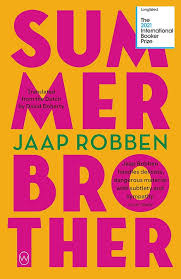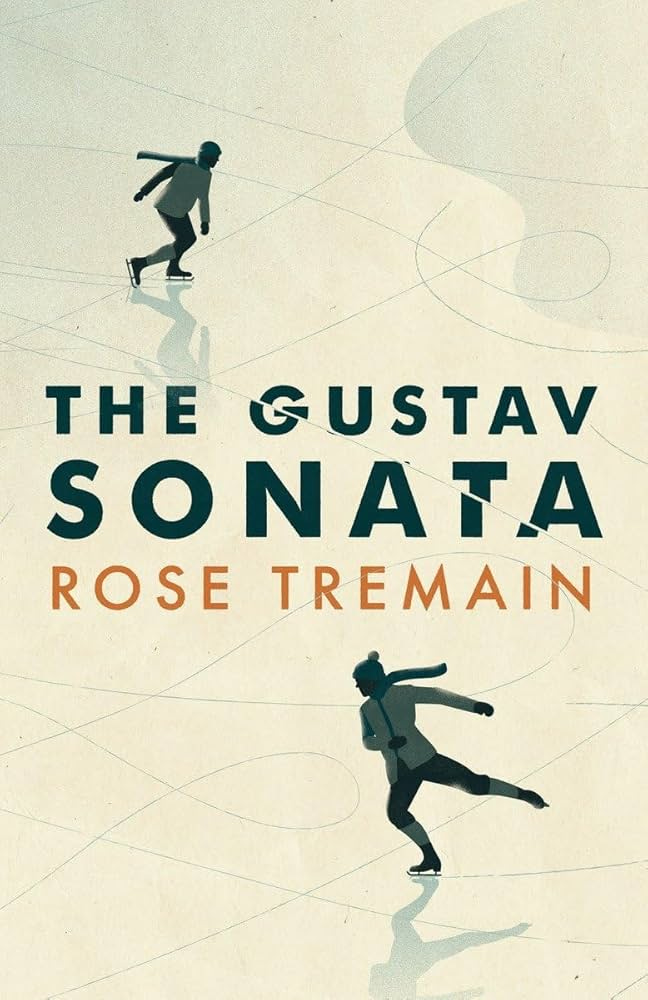What I read last week
a Dutch masterpiece, a family saga, a survivor's memoir, and a historical novel
Hello from a windy but bright Berlin! I just sent my aunt and her boyfriend to the airport, and after playing tour guide all week, I’m excited to spend the weekend catching up on my Libby backlist.
Before she arrived, I had a few long train rides, and got lucky with my library check outs. As usual, it’s an eclectic mix. Have you read any of these books? Let me know in the comments 💌
Summer Brother by Jaap Robben
I’ll often refer to past International Booker Prize nominations when picking my next read. While the regular Booker noms are awarded to the “best single work of sustained fiction written in the English language,” this sister prize is given to fiction translated into English. It’s a great way to find literature you may have missed otherwise.
Summer Brother, originally published in Dutch in 2021, is a stirring and deeply original portrait of boyhood. 13-year-old Brian’s family situation is pretty bleak — he lives in an unsanctioned trailer with his father Maurice, a low-level crook, and his mother has all but deserted him for a new family. His brother Lucien is cognitively disabled, and while Brian loves spending time with him, Maurice is loathe to drive to the group home where he resides.
When the care facility undergoes renovations and Lucien suddenly needs a place to stay, Maurice at first balks at the idea, flat out refusing to take in his son. But his mindset changes when he learns of a stipend for keeping the boy. Soon, Lucien is being moved into their shoddy caravan, and left almost entirely in Brian’s care.
The story takes place over just a few weeks, but is interspersed with riveting side characters, like a new tenant who shows Brian an alternative version of masculinity. Robben also introduces an uncomfortable sexual dynamic — Brian has feelings for Selma, a 19-year-old girl with severe cognitive disabilities at Lucien’s care facility. Robben writes organically and without judgement, allowing us to decipher our own feelings about their coupling.
Overall, I think Robben possesses a subtlety that many American authors lack. Summer Brother has a soft feeling, with many details being left out of focus. But these blurry edges add to the general feeling that this book could be set anywhere, at any time. It really worked for me.
💛 Read if you like: Salvage the Bones by Jesmyn Ward1 , books dealing with disability, Danny the Champion of the World by Roald Dahl2
A Reason To See You Again by Jami Attenberg
As Bookpeach readers know, novels about family are my comfort food.
A Reason To See You Again spans multiple generations, focusing on the women in the Cohen family: Shelly, an ambitious Silicon Valley engineer, her sister Nancy, a homemaker, and their boozy, unpredictable mother Frieda. The patriarch of the family is Rudy, a graceful and intelligent Holocaust survivor whose death leaves the women reeling.
I love how this book deals with contemporary issues (there’s a plot line that closely mirrors recent revelations about Meta exec Sheryl Sandberg) and inherited trauma. I now want to check out the rest of Attenberg’s catalogue.
💛 Read if you like: Jonathan Franzen, Jewish humor, multiple POV’s
The House of My Mother: A Daughter’s Quest for Freedom by Shari Franke
I picked this up right after I finished the explosive Hulu series Devil in the Family: The Fall of Ruby Franke, which tells the story of family vlogger Ruby Franke, a Mormon mom of six who ran the popular YouTube channel “8 Passengers” for nearly a decade. In case you aren’t on social media, Franke pleaded guilty in 2023 to horrific child abuse alongside Jodi Hildebrand, a charlatan “therapist.”
The House of My Mother is written by Shari, Ruby’s eldest daughter. Instead of focusing on salacious details, Shari writes about her own experience growing up in the Franke home, constantly being on camera and forced to present a “perfect” image. She remains extremely mindful of protecting her younger siblings and doesn’t use their names — an attempt to give them a privacy she was not afforded.
Even if you aren’t familiar with the Franke story, I highly, highly, highly recommend this book, as it invites important conversations around faith, social media, and childhood coercion. It will stay with me a long time.3
💛 Read if you like: I’m Glad My Mom Died by Jeanette McCurdy, unpacking religious extremism, true crime stories that put victims first
The Gustav Sonata by Rose Tremain
Before reading this book, I had a bland and basic picture of Switzerland: snowcapped mountains, wealth, and a proud tradition of neutrality. The Gustav Sonata, published in 2016, interrogates this “perfect” nation’s darker edges.
This book’s plot structure is ambitious; told in three parts, The Gustav Sonata mirrors a classical piece of music, with a slow buildup, intentional pacing, and crescendo. The first section of the book explores the friendship between two kindergarten boys: Anton, a precocious piano prodigy from an upperclass Jewish family, and Gustav, the eponymous lead whose mother Emilie radiates frigidity. Emilie is of the persuasion that her son must “be like Switzerland — separate and strong.” She discourages his close bond with Anton for antisemitic reasons, and when any emotion peeks through, Gustav explains, “My mother says it’s better not to cry. She says you have to master yourself.”
The next part of the book — my favorite — deals with life in neutral Switzerland in the lead up to the war. We meet Emilie’s husband (based on the real-life Paul Grueninger) who is fired from his police job after helping Jewish families enter the country from Austria. This fall from grace results in Emilie’s unbridled antisemitism.
The final third of the book, perhaps the weakest, reconnects Gustav and Anton fifty years later, grappling with their own lives as friends and Swiss compatriots.
As far as books about WWII go (and there are many!!), I appreciated how The Gustav Sonata didn’t hit me over the head with messaging. I also liked the exploration of Swiss complicity — something I hadn’t really seen in literature.
💛 Read if you like: historical fiction, The Sound of Music, three-part books
📚 On my shelf
Clearly, I’ve had some good luck lately, and I’d love to keep it going. Outside of Fulbright research, I am hoping to next read Milk Fed by Melissa Broder and Shred Sisters by Betsy Lerner. Have any of y’all read?
📚 Links and things
Loved this LitHub interview with The White Lotus props master on how he chooses books for each character. His attention to detail is remarkable; he actually went to local bookstores in North Carolina to put their bookmarks in Piper’s books. What a fun and creative job! 🌸
For more on the White Lotus’ literary leanings, I recommend this excellent piece from
.👀 I really want to watch this documentary about the group who created a secret apartment inside of Providence Place Mall — a behemoth of capitalism my friends and I frequented in college. h/t
!Ronan Farrow does it again. Check out his latest investigation into a corrupt police department protecting a serial predator here. (I listened on Audm!)
🎧 I also really recommend listening to this episode of The Daily about the ubiquitous (and cult-like) Shen Yung dance troupe.
Been loving this playlist Paul and I heard at a local wine bar in Porto 🍷
Happy reading! 💛
XOX
Alli
One of my all time recommendations.
Underrated and perhaps my favorite of his?










Loved The Gustav Sonata. Subtle, progressive, and rich. I checked it out after seeing it in your feed. Also familiar with Jami Attenberg, but….As I really enjoyed The Middlesteins, I recently dived into her memoir and two other novels and just liked her writing (or maybe just her) less and less as a result. She seems to have a stable of essentially recurring characters (e.g., a single woman who is not a fan of children, a smart but very difficult mother), a regular rotation of settings (NY, LA, NOLA or nearby, and Chicago), and a surfeit of drinking, drugging, and sex with virtual strangers—the behaviors being the ones for which I always hope to see consequences. Her range just feels limited. I wished I’d quit at The Middlesteins, but now I know! Cheers, Love!
I love stories set in Switzerland so I’ll put The Gustav Sonata on my list.